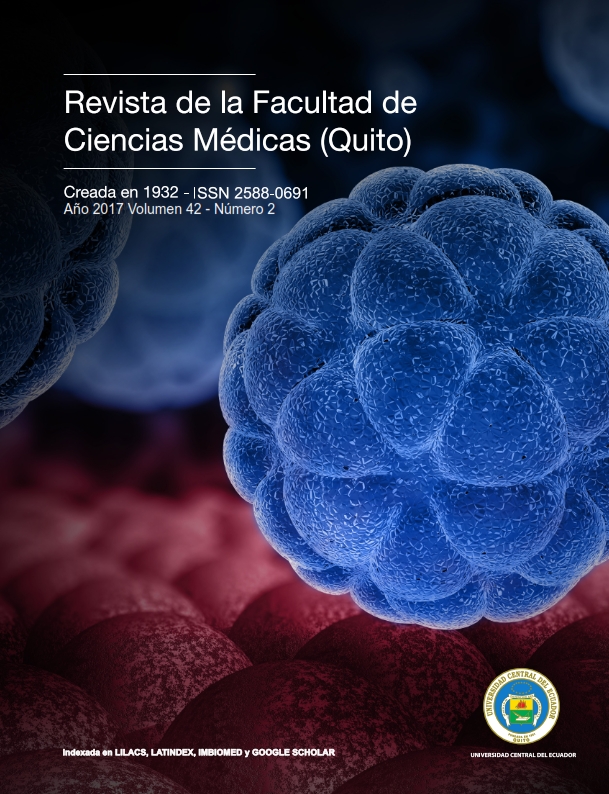¿Cuánto conocen los médicos sobre el diagnóstico y certificación de muerte encefálica?
DOI:
https://doi.org/10.29166/ciencias_medicas.v42i2.1449Keywords:
Brain death, Diagnosis, Certification, Protocol, Cadaveric donors, INDOTAbstract
Context: the correct identification and diagnosis of brain death can help facilitate the process of organ donation, thus allowing saving lives and improving the quality of the same in other people.
Objective: to measure the level of diagnostic knowledge and certification of brain death in physicians in critical areas of: Hospital Eugenio Espejo, Hospital Carlos Andrade Marin and Hospital de Especialidades FFAA
QuitoN°1, units with the highest detection rate of cadaveric donors.
Subjects and method: a cross-sectional, descriptive study that evaluated 91% of physicians working in critical areas, through a double validation instrument.
Results: a score of 54.8 / 100 (RIQ: 48.4-67.7) was obtained in the general knowledge indicator about the transplant, protocols and donation process. In the application indicator of the protocol corresponded to the median 75.0 / 100 points (RIQ: 50.0-75.0) and in the knowledge indicator of brain death and donation the result was 71.4 / 100 points (RIQ: 57, 1-71.4). The medians according to the different services were 61.3 / 100 in IntensiveTherapy and 51.6 / 100 points in emergency (p <0.0001). Regarding the level of knowledge about the INDOT and brain death protocol, 66.7 / 100 points were obtained (RIQ: 66.7-100.0). The lowest scoring section was observed in the theoretical knowledge indicator of the current protocol, with a median of 47.1 / 100 points (RIQ: 35.3-
58.8); regarding services, the median in Intensive Therapy was 52.0 and 41.2 in Emergency (p <0.0001).
Conclusion: It is opportune to implement a continuous medical education program on the current protocol for diagnosis and certification of brain death in hospitals that have critical areas, where potential cadaveric donors are detected.
Downloads
Metrics
References
Matesanz R, Marazuela R, Domínguez-Gil B, et al. y cols.) The 40 donors per million population plan: an action plan for improvement of organ donation and transplantation in Spain. Transplant Proc 2009;41(8):3453–6.
Pozo Carlos. Caracterización de los donantes de órganos, tejidos y células por muerte encefálica a causa de la siniestralidad vial en el Ecuador. 2014.
Abram M. Defining death. Medical, legal and ethical issues in the determination of death. Washington. 1981.
Brennan T, Leape L, Laird N, Hebert L, Localio R, Lawthers A, Hiatt H. Incidence of adverse events and negligence in hospitalized patients. Results of the Harvard Medical Practice Study I. New Engl J Med. 1991; 324(6):370–6.
Escalante J. Muerte encefálica. Evolución histórica y situación actual. Med Intensiva. 2000; 24(3):97–105.
Bener A, El-Shoubaki H, Al-Maslamani Y. Do we need to maximize the knowledge and attitude level of physicians and nurses toward organ donation and transplant? Experimental and clinical transplantation. Official Journal of the Middle East Society for Organ. 2008; 6(4):249.
Dardavessis T, Xenophontos P, Haidich AB, Kiritsi M, Vayionas MA. Knowledge, Attitudes and proposals of medical students concerning transplantations in Greece. International Journal of Preventive.
El-Shoubaki H, Bener A. Public knowledge and attitudes toward organ donation and transplantation: a cross-cultural study. Elsevier. 2005; 41(3).
Kim JRT, Elliott D, Hyde C. Korean health professionals’ attitudes and knowledge toward organ donation and transplantation. Int J Nurs Stud. 2004;41(3):299–307.
Matten MR, Sliepcevich EM, Sarvela PD, Lacey E, Woehlke P, Richardson C, et al. Nurses knowledge, attitudes and beliefs regarding organ and tissue donation and transplantation. Public Health Reports. 1991; 106(2):155.
Jones-Riffell AJ, Stoeckle ML. Attitudes of upper division nursing students toward organ donation. J Contin Educ Nursing. 1998; 29(6):274.
Duke J, Murphy B, Bell A. Nurses’ attitudes toward organ donation: an Australian perspective. Dimens Crit Care Nursing. 1998; 17(5):264. 63.
Akgün H, Bilgin N, Tokalak I, Kut A, Haberal M. Organ donation: a cross-sectional survey of the knowledge and personal views of Turkish health care professionals. Elsevier. 2003;
Escudero D, Matesanz R, Soratti C, Flores JI. Muerte encefálica en Iberoamérica. Med Intensiva. 2009; 33(9):415–23.
Red Consejo Iberoamericano de Donación y Trasplante. Donación y Trasplante de Órganos, Tejidos y Células. News. Trasplante Iberoamérica; 2008; 2(1):.










